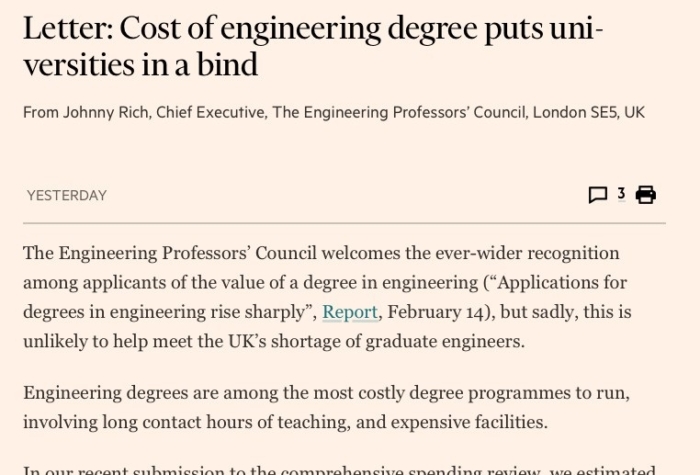The Recruitment and Admissions Toolkit has not been updated as yet but has been left here for archive purposes.
Developments in Pre-University Education Classification of Vocational Qualifications and the Tech Bacc.
There have been some developments as far as the Government’s classification of qualifications into ‘Technical Level’ (which was originally called ‘Occupational’), ‘Applied General’ and ‘Academic’. It is understood that ‘Occupational’ was meant to mean specialist craft/technician qualifications and the Government envisioned them not to be a “normal” route to higher education.
The scene changed considerably during 2014. The larger BTEC engineering qualifications have moved from being classified as ‘Applied General’ to ‘Technical Level’. Only the smaller BTEC Engineering Certificate (equivalent to one AS qualification) is left in the ‘Applied General’ category.
There may be two reasons for this:
- Following the consultation (in 2013) the Government agreed that ‘Technical Level’ qualifications could be used for entrance to university.
- The new Technical Baccalaureate (Tech Bacc) performance measure only recognises ‘Technical Level’ qualifications, not ‘Applied General’.
Relevant documents can be found at:
- https://www.gov.uk/government/uploads/system/uploads/attachment_data/file/239019/Government_response_to_consultation_on_reform_of_level_3_vocational_qualifications_for_16-19_year_olds.pdf
- https://www.gov.uk/government/uploads/system/uploads/attachment_data/file/339942/2016_16_to_19_performance_tables_inclusion_of_tech_levels.pdf
- https://www.gov.uk/government/uploads/system/uploads/attachment_data/file/340981/2016_L3_16-19_AGQ.pdf
- https://www.gov.uk/government/uploads/system/uploads/attachment_data/file/366677/The_Technical_Baccalaureate_performance_table_measure.pdf
The City and Guilds Technical Baccalaureate
City and Guilds officially launched their ‘TechBac’ qualification in, among other subjects, Engineering, Construction and IT. (This should not be confused with the Government’s Tech Bacc which, like the EBacc, is not a qualification, merely a performance measure.) The TechBac claims to be a blend of technical qualifications, a project qualification and a work placement. There appear to be two Level 2 TechBac qualifications (presumably of different sizes). Both involve a free-standing ‘Level 2 Higher Project’ and either a Technical Award or Technical Certificate in Engineering. A Level 3 TechBac is termed an ‘Advanced TechBac’ and it comes in three sizes: Certificate, Extended Certificate and Diploma. All have the free-standing ‘Level 3 Extended Project’ as a mandatory component.
The Pearson Edexcel BTEC Nationals
Most of the Level 3 BTEC National qualifications are now in the Tech Level category and therefore qualify to be included in the Government’s Tech Bacc. The BTEC Nationals are being revised and teaching to the new specification will start in 2016. This means that university admission tutors are unlikely to see the new qualifications before the 2018 entry. There is very little detail at the time of writing this paper as to the content of the new qualifications.
Edexcel are changing the names of their national qualifications and the following table is an interpretation of the changes:
| GLH* | A Level Equivalent | 2010 National | 2016 National |
| 180 | 0.5 | Certificate | — |
| 360 | 1.0 | Subsidiary Diploma | Award |
| 540 | 1.5 | 90-Credit Diploma | Subsidiary Certificate |
| 720 | 2.0 | Diploma | Certificate |
| 1080 | 3.0 | Extended Diploma | Diploma |
* GLH = Guided Learning Hours
One thing to note is that the various sizes of BTEC qualifications do allow the mixture of BTEC and A Level qualifications.
Currently, the best information on the 2016 Nationals can be found at:
Developments at Level 2
Awareness of the new school performance measures, Progress 8 and Attainment 8, is increasing and they will certainly be a great improvement on the best-5 GCSEs, which they replace from 2016. The English Baccalaureate stays but its importance may decline.
There is a range of GCSE-sized engineering qualifications that have been approved by the Government to be counted in Progress-8 and Attainment-8 metrics. In the areas of engineering and construction, these include:
- The new Person BTEC First Awards, including those developed in collaboration with the Royal Academy of Engineering as a replacement for the Level 2 Engineering Diploma;
- OCR Cambridge Level 1/2 National Certificates;
- WJEC Level 1/2 Awards.
University Technical Colleges (UTCs) are now able to blend GCSEs with these Level 2 vocational qualifications without their league table position being compromised. Up to 3 vocational qualifications can be included. Further information can be found at:
Teaching of the new versions of GCSE Science qualifications are due start in 2016. The new much tighter Key Stage 4 specifications for science mean that the old modular structure for science will no longer be practical. Schools will not be able to mix the teaching of combined and single science subjects as the additional material covered in the single sciences is spread throughout the topics. The Combined Science GCSE will be double-weighted. No single Combined Science will be available. The new specifications can be found at:
- https://www.gov.uk/government/uploads/system/uploads/attachment_data/file/303093/GCSE_single_science_content-.pdf
- https://www.gov.uk/government/uploads/system/uploads/attachment_data/file/307619/GCSE_combined_science_content.pdf
The tighter specifications mean that there will be less variation between awarding bodies and that would have made the design of A level sciences easier – had their revision been delayed until 2018.
Any views, thoughts, and opinions expressed herein are solely that of the author(s) and do not necessarily reflect the views, opinions, policies, or position of the Engineering Professors’ Council or the Toolkit sponsors and supporters.




